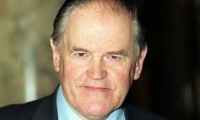Robert Armstrong
(coined the phrase "economical with the truth") | |
|---|---|
 | |
| Born | Robert Temple Armstrong 30 March 1927 |
| Alma mater | Christ Church, Oxford |
| Member of | Nobody's Friends |
Robert Armstrong, Baron Armstrong of Ilminster (born 30 March 1927), son of the musician Sir Thomas Armstrong, is a British life peer and former senior civil servant.
He was Prime Minister Edward Heath's private secretary from 1970 to 1974.
When allegations of child sexual abuse against Sir Edward Heath emerged in 2015,[1] ten years after his death, Lord Armstrong said he had "never felt a whiff of sexuality about Ted Heath, whether it was in relation to women, men or children".
On 14 August 2015, Lord Armstrong told Radio 4's Today Programme the allegations were "so totally uncharacteristic and unlikely" that he did not believe them to be true:
- "My incredulity is based on the way of life of a man and about his character and his personality.
- "When he was at home he had two policemen on the gate, he had the personal protection officer from Scotland Yard in the house, he never drove a car himself, he always had an official driver.
- "It just seems to me highly unlikely that he could have escaped all that to do the kind of thing that is described. I knew him for 35 years, I worked very closely with him while he was prime minister, and we remained friends for the rest of his life.
- "You usually detect some sense of sexuality when you are friends or work closely with them. I think he was completely asexual. There are some people like that and I think he was one of them."[2]
Life
Robert Armstrong was educated at the Dragon School, Eton College, where he was a King's Scholar, and Christ Church, Oxford, where he read Greats. In a long civil service career, Armstrong worked in several departments, including HM Treasury and the Home Office. From 1970 to 1975 he served as the Principal Private Secretary to the Prime Minister. He was knighted in 1978. From 1979 to 1987, he served as Secretary of the Cabinet under Margaret Thatcher. He was subsequently made a life peer as Baron Armstrong of Ilminster, of Ashill in the County of Somerset in 1988, and sits as a crossbencher.[3]
He is credited with bringing the phrase "economical with the truth" into popular usage, after he used it during Peter Wright's Spycatcher trial in 1986 - his use of the phrase was subsequently included in the Oxford Dictionary of Quotations.
From 1994 to 2006, Lord Armstrong was Chancellor of the University of Hull. He was chairman of the Sir Edward Heath Charitable Foundation until 2013.
Allegations of Child abuse cover-up
Armstrong was aware of Sir Peter Hayman’s paedophilia, and since leaving office, has commented “Clearly, I was aware of it at the time but I was not concerned with the personal aspect of it.”[4]
Armstrong gave Margaret Thatcher what he calls a “veiled” warning not to sanction Jimmy Savile’s knighthood for charitable work, due to allegations around his sexual abuse of children.[5]
Armstrong was warned by the security services in 1986 that an MP had ‘a penchant for small boys’. But no action was taken and Armstrong, who refused to name the MP involved, insisted the allegations were just ‘shadows of a rumour’. He said he believed the decision not to investigate the paedophile claims was ‘correct at the time’.[6]
In popular culture
Armstrong has been portrayed by the following actors in film and television productions;
- Rupert Vansittart in the 2002 BBC production of Ian Curteis' controversial The Falklands Play.
- Timothy West in the 2004 BBC production of The Alan Clark Diaries.
References
- ↑ "Police consider limited inquiry into Ted Heath child sex abuse claims"
- ↑ "Sir Edward Heath was completely asexual, says adviser"
- ↑ Lundy, Darryl. "Robert Temple Armstrong, Baron Armstrong of Ilminster". The Peerage. External link in
|publisher=(help)Page Module:Citation/CS1/styles.css must have content model "Sanitized CSS" for TemplateStyles (current model is "Scribunto"). - ↑ "Call for inquiry into links between senior civil servant Sir Peter Hayman and paedophile network in the 1980's"
- ↑ "The Westminster child abuse ‘coverup’: how much did MPs know?"
- ↑ http://www.dailymail.co.uk/news/article-3172775/I-won-t-child-abuse-MP-Fury-Mrs-T-s-Cabinet-chief-defends-failure-act-senior-Tory.html "I won't name child abuse MP: Fury as Mrs Thatcher's Cabinet chief defends failure to act over senior Tory"]
Wikipedia is not affiliated with Wikispooks. Original page source here